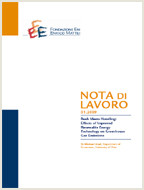Urban Distribution Centres and Competition among Logistics Providers: a Hotelling Approach

14.03.2017
D43, H23, L13, Q58, R41, R48
Urban Distribution Centre, City logistics, Sustainable Urban Transport Policy, Hotelling Spatial Competition Model, Market-Based Measures, Public Subsidy
Society and Sustainability
Stefano Pareglio
In recent years several European municipalities have paired market-based measures with urban distribution centres (UDC) in order to reduce CO2 emissions and make more sustainable urban freight flows. However, UDCs may add reloading costs and extra delivery times which have relevant impact on both urban supply chains and the competition among traditional and UDC-based logistics service providers in terms of service quality and freight rates. By using a duopolistic Hotelling framework, we show that market-based measures and subsidies might be substitutes to enhance the demand for UDC-based providers but public funding can be reduced by improving the quality of UDC services. These results can enlarge the scope for investments in UDC value-adding services in order to decrease private crowding-out effects in the long run.
***
Suggested citation: Crotti, D., E. Maggi, (2017), ‘Urban Distribution Centres and Competition among Logistics Providers: a Hotelling Approach’, Nota di Lavoro 17.2017, Milan, Italy: Fondazione Eni Enrico Mattei
